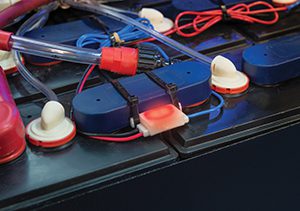Maintenance Tips for Your Battery Watering System: Ensuring Optimal Performance
A battery watering system is an essential component for maintaining the health and longevity of industrial and commercial batteries, particularly those used in electric forklifts. Proper care of your battery watering system ensures that your batteries are always hydrated at the correct levels, which is crucial for preventing damage, extending battery life, and maintaining optimal performance. In this blog, we’ll cover some key maintenance tips to help you keep your battery watering system in top condition.
1. Regularly Inspect the System Components
One of the most important aspects of maintaining your battery watering system is conducting regular inspections of all system components. This includes:
- Watering Tubes and Fittings: Check for any signs of wear, cracks, or leaks in the tubing and fittings. Damaged components can lead to uneven watering, which can harm your battery cells.
- Valves: Ensure that the watering valves are functioning correctly. Stuck or malfunctioning valves can cause overfilling or underfilling of the battery cells.
- Float Indicators: Inspect the float indicators for any signs of damage or sticking. These indicators help monitor the water level in each cell, so it’s crucial that they are working properly.
Regular inspections help catch small issues before they turn into major problems, preventing costly repairs and battery damage.
2. Keep the System Clean
Dirt, dust, and debris can accumulate on your battery watering system over time, potentially causing blockages or other issues that affect performance. Regularly clean the system using a damp cloth to remove any buildup on the tubes, fittings, and valves. Ensure that the area around the batteries is also clean to minimize the chance of contaminants entering the system.
If you notice any residue or buildup within the tubing, it may be necessary to flush the system with distilled water to ensure a clear and unobstructed flow.
3. Check Water Quality
The quality of water used in your battery watering system is critical. Always use distilled or deionized water, as tap water contains minerals and impurities that can build up in the battery cells, leading to reduced performance and a shorter battery lifespan. Regularly check the water source to ensure it remains free of contaminants.
Ensure that the water filtration system is functioning properly and replace filters as needed.
4. Test the System Regularly
Testing your battery watering system regularly helps ensure that it’s operating correctly. To test the system:
- Manually Check Water Levels: Occasionally, manually check the water levels in your battery cells. This helps verify that the system is accurately maintaining the correct water levels.
- Inspect for Air Leaks: Air leaks can cause the system to malfunction, leading to improper watering. Listen for hissing sounds during operation and inspect connections for tightness.
Regular testing helps catch issues early and ensures that your system is functioning as intended.
5. Schedule Regular Professional Maintenance
While regular inspections and maintenance can be done in-house, it’s also a good idea to schedule periodic professional maintenance. A qualified technician can perform a thorough inspection of the entire system, identify potential problems, and carry out any necessary repairs or adjustments. Professional maintenance helps ensure the longevity of both the watering system and the batteries it serves.
6. Replace Worn or Damaged Parts Promptly
Even with regular maintenance, parts of your battery watering system may wear out over time. It’s important to replace any worn or damaged components as soon as they’re identified to prevent further issues. Keep spare parts, such as tubing, fittings, and valves, on hand so you can quickly address any problems that arise.
7. Educate Your Team
Ensuring that your team is knowledgeable about the operation and maintenance of your battery watering system is key to preventing mistakes and prolonging the system’s life. Provide training on how to inspect, clean, and test the system, and encourage them to report any issues they observe. A well-informed team can help maintain the system’s performance and ensure that your batteries are always in top condition.
Conclusion
A well-maintained battery watering system is essential for keeping your batteries in optimal condition and ensuring their longevity. A lot of focus is placed on the battery itself, but the battery watering system is another component that needs some attention. By following these maintenance tips, you can prevent issues, reduce downtime, and extend the life of your batteries, ultimately saving on costs and improving the efficiency of your operations. Regular inspections, cleanings, and professional maintenance will go a long way in ensuring that your battery watering system continues to perform at its best.
Work with our team on setting up Periodic or Total Maintenance Agreements to have your batteries, chargers, and battery watering systems inspected to ensure proper care of your assets.

